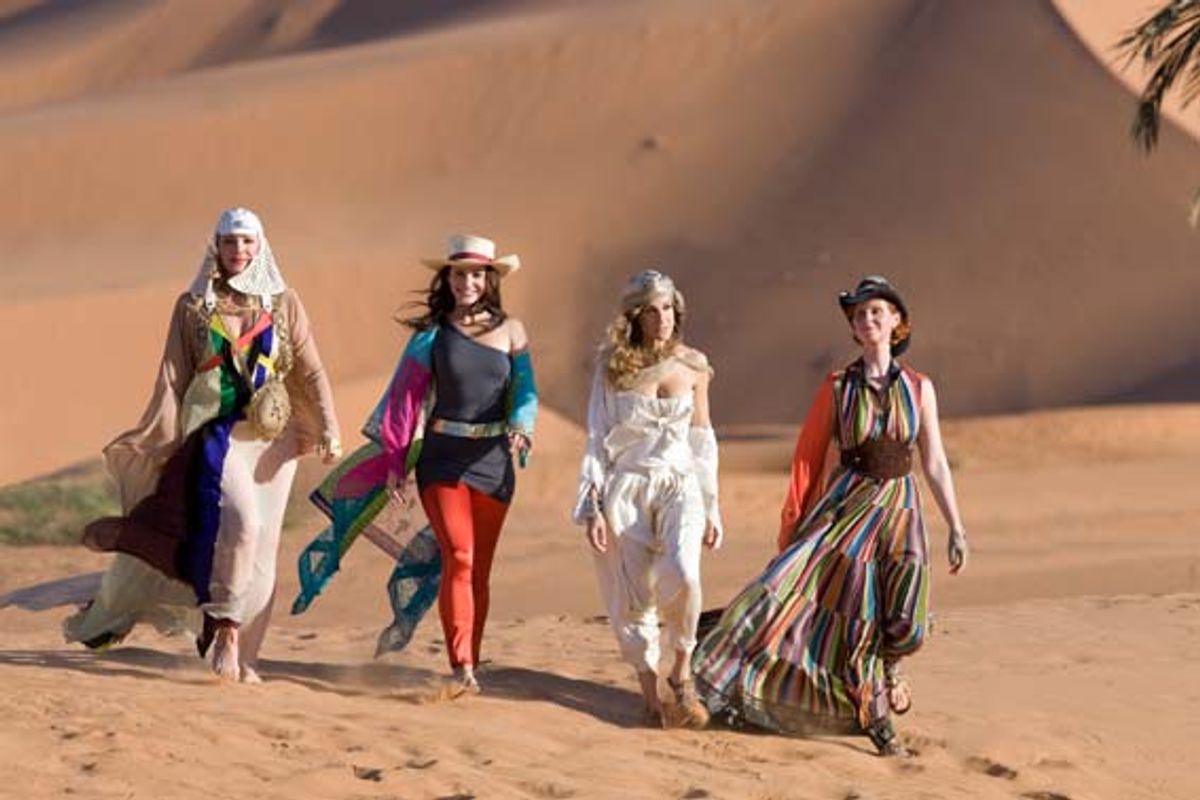I'm a heterosexual, Muslim dude who until recently thought pleated khakis and loafers were "hip" and mistook Bergdorf Goodman for an expensive Swiss chocolate. So it is not surprising that 40 minutes into "Sex and the City 2," a 150-minute cotton candy fantasy accessorized with materialism and fashion porn, I was comatose with boredom.
But I was defibrillated by the film's detour into Abu Dhabi (really Morocco and studio sets) and what can only be described as an Orientalist's wet dream. After discovering they will visit the Middle East, the ladies whip out hall-of-fame Ali Baba clichés: References to "magic carpet" (a double entendre, naturally), Scheherazade and Jasmine from "Aladdin" come in rapid succession. Upon hearing a stewardess give routine flight instructions in Arabic, Samantha behaves like a wild-eyed child hearing a foreign language for the first time. "I wonder what she’s saying. It sounds so exotic!"
Michael Patrick King's exquisitely tone-deaf movie is cinematic Viagra for Western cultural imperialists who still ignorantly and inaccurately paint the entire Middle East (and Iran) as a Shangri La in desperate need of liberation from ignorant, backward natives. Historian Bernard Lewis, the 93-year-old Hall of Fame Orientalist and author of such nuanced gems as "The Arabs in History" and "Islam and the West," would probably die of priapism if he saw this movie. It's like the cinematic progeny of "Not Without My Daughter" and "Arabian Nights" with a makeover by Valentino. Forget the oppressed women of Abu Dhabi. Let's buy more bling for the burqa!
Our four female cultural avatars, like imperialistic Barbies, milk Abu Dhabi for leisure and hedonism without making any discernible, concrete efforts to learn about her people and their daily lives. An exception is Miranda, whose IQ drops about 100 points as she dilutes the vast complexities of a diverse culture into sound bites like this: "'Hanh Gee' means 'yes' in Arabic!"
Only it doesn't -- it's Hindi and Punjabi, which is spoken by South Asians.
She also incorrectly tells the audience that all women in the Middle East have to cover themselves. And, yes, nearly every single Middle Eastern female character in "SATC 2's" imaginative rendition of "Abu Dhabi," is veiled, silent or subdued by aggressive men.
Like curious visitors staring at an exotic animal in the zoo with equal doses of horror and fascination, the four "girls" observe a niqabi female eating French fries by carefully lifting her veil for each consumed fry. After witnessing this "Ripley's Believe It or Not" event, Samantha declares, "It's like they don't want [women] to have a voice."
If our cultural ambassadors truly cared about saving Muslim women, they surely would try to help them during the film's interminable two and half hour running time, no? Sadly, instead, these incredibly shallow mock-feminists can't even bother to have one decent conversation with a Muslim woman, because they're too immersed in picnics on the desert and singing Arab disco karaoke renditions of "I Am Woman." In fact, Abu Dhabi is just peachy when it's a fantasy land where they ride around in limos and get comped an extravagantly vulgar $22,000 hotel suite. However, only when that materialism is taken away do they worry, in only the most superficial way, about sexual hypocrisy and women's oppression.
Meanwhile, the perpetually self-absorbed Carrie finds enlightenment in the simple, wise words of her Indian manservant Gaurav, who functions as the movie's life-changing, magical minority. And Samantha, our "Western" avatar of freedom and liberation, offers a juxtaposition to the silent, oppressed Muslim women by making immature puns like "Lawrence of my Labia" and performing fellatio on a sheesha pipe in public.
The movie uses only two broad colors to paint the Middle East: One depicting an opulent Eden for our blissfully ignorant protagonists to selfishly use as a temporary escape, and the other showing an oppressive dungeon populated by intolerant men that cannot comprehend cleavage or bare shoulders.
Consider the film's painful climax, in which Samantha, now wearing shorts and a low-cut top, spills dozens of condoms from her purse in the middle of a crowded market. Right before the condom explosion, the Islamic call to prayer, the Adhan, is conveniently heard for no discernible reason. The angry, hairy men, overwhelmed by anger and shock, decide to abandon their daily activities and busy life to encircle Samantha and condemn her as a harlot and slut, but not before Samantha proudly holds the condoms up high and dry humps the air telling the men she uses them to have sex. Because they cannot tolerate a sassy, back-talking, condom-using female baring her legs, they decide en masse to spontaneously chase all four women. Appearing like an oasis in the desert, two mysterious women in a burqa silently nod to the four girls, who subsequently follow the women into a secret room revealing the existence of a secret book club attended by a dozen niqabi women, who disrobe to reveal their hidden designer clothes, fashionable shoes and makeup.
OK, a bubble gum approach to reality is to be expected from "SATC2." And one could imagine a scenario in which the frothy light comedy could be used to erase mutual misunderstandings. After all, Muslim women around the world, who religiously watched the show, would love a strong, empowered Muslim female "SATC" character who could enlighten Western audiences about the complex, and at times oppressive, reality of Middle Eastern women while simultaneously rocking Ferragamos. Instead, the film exists in a wacky cultural vacuum blissfully unaware of its own arrogance and prejudices.
Apparently, we're meant to believe Muslim women in the Middle East are equally self-absorbed, vain and materialistic. After completely dissing the Middle East, its people, its religion and its culture, it's "Sex and the City" that truly insults the Muslim women, by silencing them entirely.
Wajahat Ali is the author of "The Domestic Crusaders," a play about Muslim Pakistani Americans that will be published by McSweeney's in the Fall 2010. He blogs at Goatmilk.



Shares